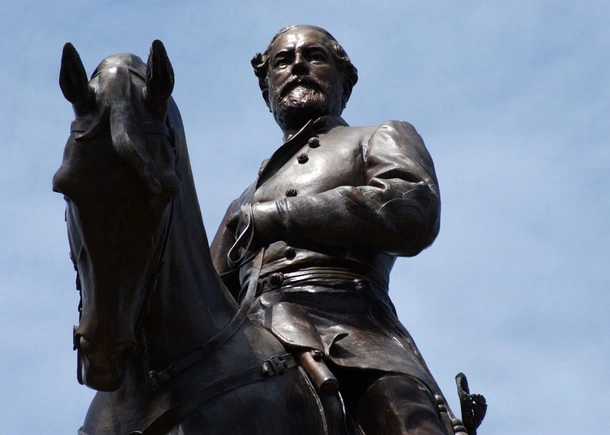Washington & Lee University Removes Plaque Commemorating Robert E. Lee's Horse
Washington & Lee University, a prestigious institution that was originally named Augusta Academy and then Liberty Hall Academy, has decided ...

Washington & Lee University Removes Plaque Honoring Confederate General's Horse
Washington & Lee University, a prestigious institution that was originally named Augusta Academy and then Liberty Hall Academy, has decided to remove a plaque that honored Confederate General Robert E. Lee's horse, Traveller. The university, which is named after George Washington and Robert E. Lee, made this decision as part of ongoing efforts to address the legacy of slavery and racism on campus.
A plaque honoring the horse of General Robert Lee, named Traveller, has been removed from its location outside Lee Chapel at a university. The plaque, placed by the Virginia Division of the United Daughters of the Confederacy, described Traveller as a faithful and beloved horse. This comes after the university recently removed plaques from the room where Lee was inaugurated as president of the school and his office during a certain period.
Washington and Lee University has decided to remove the name of Confederate General Robert E. Lee from the institution. However, a tweet suggests that the university is not only canceling Lee but also his horse, Traveler. The tweet claims that Traveler was initially euthanized due to untreatable tetanus but will now be metaphorically put down by the unstoppable force of cancel culture.
In a recent tweet, Jonathan Turley shared a quote from Kamron Spivey, the president of Students for Historical Preservation, regarding the controversy surrounding the presence of a statue of Robert E. Lee's horse, Traveller, on a college campus. Spivey expressed that Traveller was a beloved part of the campus story and that people enjoyed hearing tales about animals because they are seen as innocent. Spivey also mentioned that until recently, few people seemed bothered by the horse's presence.
University officials are considering removing any reference to Lee, an educator, due to concerns that it may negatively impact student enrollment. However, this decision has been criticized by some who believe that the university should preserve the original markers as a way to contextualize the site's history.
Augusta Academy, founded in 1749, underwent several relocations before being renamed Liberty Hall Academy in 1776. In 1796, the academy faced financial difficulties. To support the institution, U.S. President George Washington made a significant donation of 100 shares of James River Canal Company stock, which he had received as a gift from the Virginia General Assembly. This generous contribution continues to contribute to the university's operating budget.
The institution previously known as Washington Academy has changed its name to Washington College. The decision was made by the trustees, who expressed their gratitude for the opportunity to promote literature and the arts in the growing empire. This change reflects the institution's commitment to these ideals.
Four months after the end of the Civil War, General Robert E. Lee was invited to become the president of Washington College by the board of trustees. Lee accepted the position and over the next five years, he made several significant changes to the college. He incorporated the local law school, introduced undergraduate courses in business and journalism, added modern languages and applied mathematics to the curriculum, and expanded offerings in the natural sciences. Lee also implemented a tradition of student self-governance, putting the students in charge of the honor system that was previously overseen by the faculty. These changes made by Lee had a lasting impact on the university.
Washington and Lee University, originally named Washington College, was renamed in 1870 to honor General Robert E. Lee after his death. However, the university's Board of Trustees acknowledged in 2021 that the name is a subject of controversy. They stated that the association with Lee can be painful for those who experience racism, particularly African Americans, and may hinder efforts to foster a diverse community. On the other hand, some argue that the name is a fitting tribute to the contributions made by Lee and George Washington to the institution.
